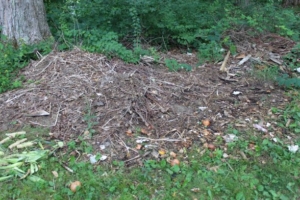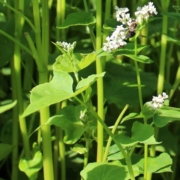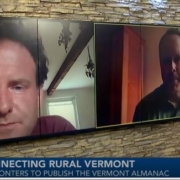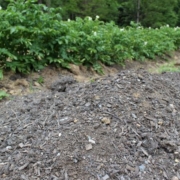Abuzz
The pleasure of my summer has been watching the food plot I planted in May come along . . . has been watching the wildlife garden I planted in May come along . . . has been watching the . . .
It’s hard to come up with the right descriptor.
I broke ground in May for a wildlife garden in the back-backyard, up against the tree line. The problem with calling it a wildlife garden is that it sounds so Ranger Rick. As the proud father of a three-year-old, I’m nevertheless trying to hold on to a bit of my adult self. It is a food plot, but I’m uncomfortable with that blunt, clinical phrase in the other direction, especially with the implication that its sole purpose is to hang a tree stand over. To be clear I’m not above meat-hunting, and if a fat doe presents a legal opportunity this fall while availing herself of the forage, there’s a chance she’ll end up in the freezer. But the goal here is a lot bigger than hunting. It’s about giving back, to deer but also to every other animal that wants to avail itself of the planting.
The original plan was a buckwheat crop that I’d knock over right about now, to be followed by a fall clover planting. In theory, I want to kill the buckwheat before it goes to seed. But in practice, I just can’t bring myself to do it. When I envisioned helping animals I was picturing mammals, but this planting is so abuzz with thousands of insects that I’ll likely miss my window.
In the quiet morning you can hear the buzz emanating from the quarter-acre plot at about 50 feet off. I spent some time this morning standing in the chest-high flowers, just feeling the pulse. There were hundreds if not thousands of honey bees, and bumble bees of all different species, but most remarkable were the pollinators I’d never taken the time to observe. Little yellow jacket mimics that hovered like hummingbirds. Jewel-colored flies and wasps of all sizes. Black insects with orange bottoms and soft, moth-like wings. Dainty wasps with hornet-butts and delicate, French-looking wings. Aggressive-looking horsefly-sized flies. Nondescript flies. Ants of every size and shape. Tiny butterflies that you could spend a morning trying to ID.
I remember interviewing an entomologist for a story years ago, who told me that while there were something-thousand known insects in the Northeast, there are likely thousands more that have yet to be classified. There’s a chance that some of the pollinators I was watching have never been documented. And with the well-known struggles pollinators are having these days, there’s a chance some could go extinct without ever being “known.”
And so the buckwheat stands, and the clover planting is being pushed off until the buzz dies down.
Vermont Almanac on WCAX
Dave Mance and Patrick White appeared on WCAX on July 13 to talk about Vermont Almanac. Our thanks to host Céline McArthur–the conversation was a great opportunity to introduce our new annual book about life in rural Vermont to an audience around the state. Here’s a link in case you missed it, here’s a link to the WCAX segment.
Taking Responsibility
Wendell Berry once pointed out that if we believe that the ultimate reality is political, and therefore the ultimate solutions are political, we’re going to have a hard time doing right by the land.
I’ve been thinking of this as Vermont unrolls its new mandatory composting regulations. As of July 1, residents are required to keep vegetable waste out of the trash, though in reality ANR will not be searching garbage bags for compliance. If these composting regulations are to lead to a greater good, people will have to buy in and change their habits. The private sector will need to figure out how to absorb or pass on the extra costs. Homeowners will have to figure out how to discourage or live with more crows and skunks and coons and bears. Farmers are going to have to figure out how to incorporate finished compost in lieu of synthetic fertilizer, even though it’s more expensive and harder to handle. If people are going to be motivated to do this, they’ll need to see the earth as something more than dead matter upon which they drive to and from work.
Berry’s point is that when we see things through a political lens, it’s easy to sub out the hard work to others and then Monday-morning-quarterback the results. Politics – especially these days – also turns simple things into complicated, existential things. The relatively straightforward issue of not throwing a banana peel in the garbage can become an affront to our personal liberty and right to make a living, or a dramatic first step towards a worldwide eco-revolution. The reality is that the politics here are a nudge, trying to push society in a less wasteful direction.
If we’re to do the enormous work of learning to live within our means on an increasingly fragile planet, we need to start with simple steps that are manageable and that we can each be responsible for. For those of us who live in rural areas – which geographically speaking is the majority of us – we now have to scrape our food scraps into a bowl and walk it to the hedgerow each night. I can handle that.

Composting can be as simple or as complicated as you want to make it. Here’s the years-old compost pile in my hedgerow. We compost everything, including meat scraps. It doesn’t smell unless you’re standing on top of it. We ignore the crows and opossums. We delight in visits by foxes and bears. We’re not trying to make a finished product.



